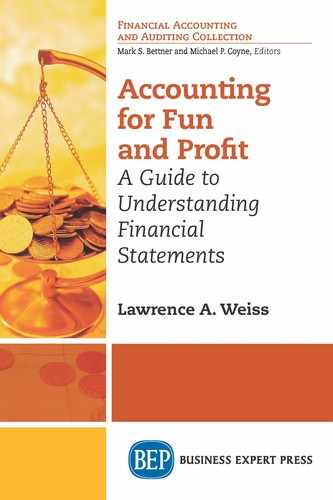If you were building a house, would you hire an architect, give her some money and say, “Build me a house?” If you did, the house might end up on the front cover of an architectural magazine, but it might not be a house you would want to live in. I suggest you might benefit from learning a bit about architecture before building a house so that you could work with the architect to build the house you want to live in. Similarly, if a surgeon (who is paid to cut people open, who enjoys cutting people open, and who honestly believes she can best cure people by cutting them open) suggests an operation, you would be smart to learn about your illness and get a second opinion before having the surgery.
Accounting is no different, and it is much too important to be left to the accountants. If there is one message you should take away from this book, it is NEVER TRUST AN ACCOUNTANT! This may seem a bit harsh, but why would you trust an accountant any more than an architect, doctor, or other professional? A healthy dose of skepticism is a good thing. Any time you hire a professional, it is best to have a basic understanding of what the professional does so you can tell the professional what you want them to do. If you have a medical condition that might require surgery, know enough about your condition to determine whether surgery is the right course of action and, if it is, to find the best surgeon for you (not a good idea to try doing surgery on yourself!). Likewise, if you are managing a firm, investing in a firm, lending to a firm, or even working for a firm, you should be able to read the firm’s financial statements and ask questions based on those statements.
This book explains the fundamentals of financial statements. Many accountants would benefit from reading this book as it may help them better understand why they are doing what they do, and improve their ability to explain accounting to others. However, the book is not designed for accountants. It is designed and meant for those who use and provide accounting information (i.e., those who hire accountants).
The book takes the perspective of a user of financial information and therefore limits its coverage of some of the technical aspects (some of the details can be left for the professionals). This means that many of this book’s topics are aimed at understanding what an accountant means when she uses certain terms and what the limits to accounting are. Some parts of the book are still a bit technical, but they are included because learning the basics of accounting is like learning vocabulary and grammar in a language. After all, accounting is a type of language: it is the language of business.
After reading this book, you should be able to pick up an annual report, read it, understand much of it, and have a solid foundation to start asking questions about the firm. Moreover, if there is something you do not understand, seek out an accountant and ask. There are accountants in all organizations and they generally welcome questions. If the accountant cannot answer your question, it means one of two things: One, there is a problem in the financial statements if the firm is presenting material in a manner that even an accountant cannot understand. Two, it means you need to find another accountant (as with all professionals, some are better than others).
Hopefully this book will show you that accounting can be fun and informative, or at least that it is not as painful as you may fear.
